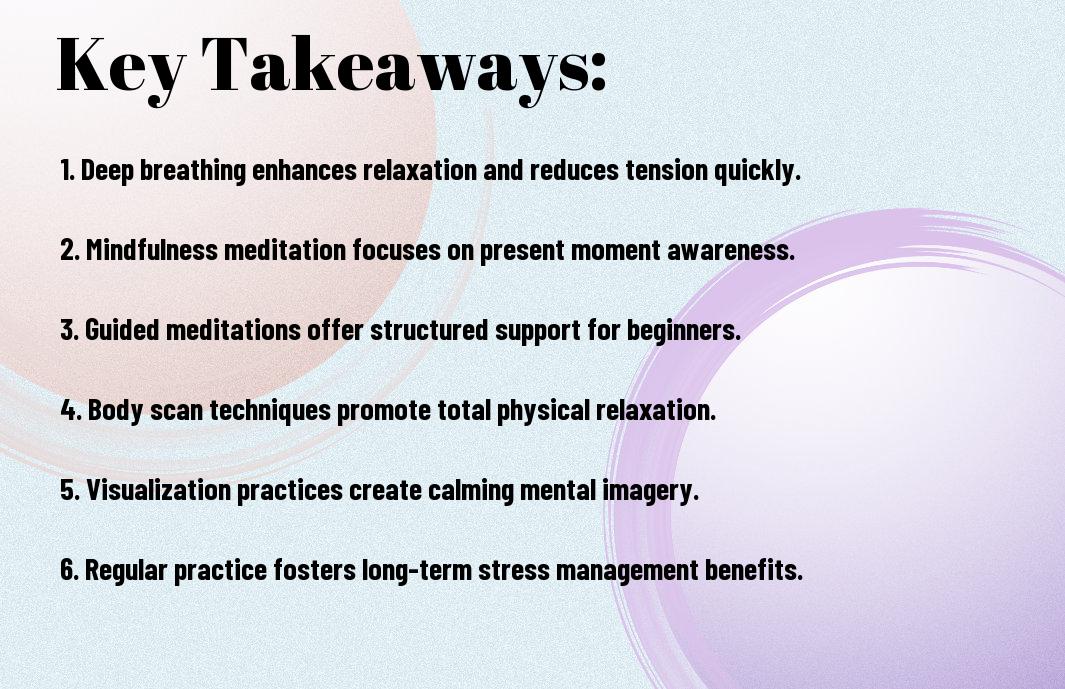Many people struggle with managing stress in their daily lives, leading to negative impacts on both mental and physical health. If you find yourself overwhelmed, incorporating meditation into your routine can provide significant benefits for stress relief. In this post, you will explore various meditation techniques that not only help calm your mind but also enhance your overall well-being. By applying the right methods, you can reclaim your inner peace and effectively combat the pressures of modern living.
Key Takeaways:
- Mindfulness meditation is highly effective for reducing stress, as it encourages staying present and accepting thoughts and feelings without judgment.
- Breath awareness techniques, such as deep breathing exercises, can quickly induce relaxation and help manage stress levels throughout the day.
- Guided imagery and visualization techniques allow individuals to mentally escape and create a peaceful environment, promoting a sense of calm and stress relief.
Understanding Stress and Its Impact
To effectively manage stress, you must first grasp its nature and effects. Stress is your body’s response to challenging situations, influenced by various external and internal factors. Long-term exposure can lead to a multitude of health issues, including anxiety, depression, and cardiovascular problems. Recognizing how stress manifests in your life enables you to take control and explore effective stress relief techniques, including meditation.
The Science of Stress
To comprehend stress deeply, you should know that it triggers a physiological response in your body, activating the fight-or-flight mechanism. This involves the release of stress hormones like cortisol and adrenaline, which prepare you to confront or flee from perceived threats. However, when stress becomes chronic, these responses can negatively impact your mental and physical health.
How Meditation Affects Stress Levels
The practice of meditation has profound effects on your stress levels. It encourages relaxation, allowing your mind and body to reset and recover from the demands of daily life.
Affects of meditation on stress levels have been shown to be significant. Regular practice can lead to a marked decrease in levels of cortisol, the hormone associated with stress, thereby promoting feelings of calmness and well-being. By focusing your attention and enhancing your awareness of the present moment, meditation reduces your response to stressors. This not only improves your emotional resilience but may also mitigate the risk of stress-related illnesses, allowing you to manage challenges more effectively and enjoy a healthier lifestyle.

Mindfulness Meditation
While navigating the chaos of daily life, mindfulness meditation offers a powerful antidote to stress. This technique invites you to focus on the present moment, drawing your attention away from worries about the past or future. By cultivating awareness of your thoughts, feelings, and sensations, you empower yourself to respond to stressors with a sense of calm and clarity. This practice not only enhances your mental well-being but also fosters a deeper connection with your own experiences.
Techniques and Practices
Techniques used in mindfulness meditation include focused breathing, body scans, and mindful observation. You might start by finding a quiet space, sitting comfortably, and directing your focus to your breath. As thoughts arise, acknowledge them without judgment and gently return your attention to your breathing. Incorporating practices like observing your surroundings or engaging in mindful walking can further enhance your experience and deepen your understanding of the present moment.
Benefits for Stress Relief
Behind the practice of mindfulness meditation lies a wealth of benefits for alleviating stress. You may notice a significant reduction in anxiety levels and improved emotional regulation as you integrate this technique into your routine.
A consistent mindfulness meditation practice can lead to enhanced resilience to stress and a greater sense of inner peace. As you develop a better awareness of your emotions, you can identify stress triggers and respond to them more effectively. Furthermore, mindfulness meditation has been shown to lower levels of the stress hormone cortisol, supporting your overall mental health. By committing to this practice, you create a buffer against life’s pressures, allowing you to approach challenges with a clearer, more focused mindset.
Guided Meditation
Now, guided meditation is a popular technique for stress relief, as it involves following a facilitator’s voice or instructions, allowing your mind to relax more easily. This practice can include visualizations, breathing exercises, and relaxation techniques, helping you to focus and unwind. For beginners and seasoned meditators alike, guided sessions can deepen the experience and enhance the effectiveness of your meditation practice.
Finding the Right Guidance
Against the backdrop of countless resources available, finding the right guidance for your meditation practice can feel overwhelming. It’s necessary to explore different styles and voices to discover what resonates with you personally. Consider seeking out qualified instructors or platforms that align with your needs and preferences.
Advantages of Guided Sessions
At various levels of experience, guided meditation offers numerous benefits that can transform your practice. You can receive structured sessions that help to keep your focus on the present while providing a sense of direction. This approach allows your mind to relax without the pressure of self-guidance.
But the advantages of guided sessions extend beyond mere structure. You often experience enhanced relaxation and deeper immersion as the facilitator prompts you through visualization and mindfulness techniques. Additionally, guided meditation can help you develop a consistent practice, which is necessary for long-term stress relief. With the support of a skilled guide, you’ll find that you can explore your thoughts and emotions more comfortably, leading to a more profound sense of inner peace and well-being. Moreover, if you ever struggle with self-doubt or wandering thoughts, having guidance can significantly ease your meditation journey.

Body Scan Meditation
Unlike traditional meditation techniques that often focus on breath or visualization, body scan meditation invites you to connect deeply with your physical sensations. This practice encourages you to observe each part of your body without judgment, fostering a sense of awareness and relaxation. By tuning in to your body, you can release built-up tension and achieve a state of calm more effectively, providing a useful tool for handling stress.
Process and Application
Body scan meditation involves systematically directing your attention to various areas of your body, from your toes to your head. You can practice this technique lying down or seated, taking a few minutes to breathe deeply before beginning. Focus on each body part, noting any sensations—like tension or relaxation—before moving on. This practice can be incorporated into your daily routine, making it a flexible option for managing stress.
Reducing Tension Through Awareness
Meditation helps you become aware of where you hold tension in your body, allowing you to recognize and release it. Through practice, you might discover that certain areas carry stress more than others, such as your shoulders or lower back. Noticing these patterns can empower you to take action and incorporate relaxation strategies into your routine, ultimately enhancing your overall well-being.
It is vital to understand that building awareness of your body’s sensations through body scan meditation can be transformative. When you focus on the parts of your body that hold tension, you cultivate a heightened sense of consciousness around your physical and emotional states. This awareness allows you to better respond to stress, promoting a more positive mindset and helping you find balance amidst life’s challenges.
Transcendental Meditation
All around the world, individuals practice Transcendental Meditation (TM) as a powerful technique for reducing stress and achieving a deeper state of relaxation. This effortless practice involves silently repeating a specific mantra, allowing your mind to settle into a state of profound tranquility while bringing awareness to the present moment.
Overview of the Technique
Beside its simplicity, TM is designed for anyone, regardless of experience level or belief system. You sit comfortably with your eyes closed and silently repeat a personalized mantra for about 15-20 minutes, ideally twice a day. This unique approach encourages a natural state of relaxation and inner peace.
Effectiveness in Stress Management
Stress often burdens your daily life, but you can find relief through Transcendental Meditation. By allowing your mind to transcend ordinary thoughts, this technique helps you access a state of *deep rest*, resulting in lower levels of *stress hormones*, enhancing your overall mental clarity, and improving your emotional well-being.
Technique benefits arise when you practice TM consistently. You will likely notice a significant decrease in *anxiety and tension*, supporting better coping mechanisms for stress. The practice promotes a deeply restorative state in your body, giving you a consistent source of *calmness and relaxation*. With just a few minutes each day, you can experience *remarkable improvements* in your stress levels and quality of life.
Loving-Kindness Meditation
Many find that Loving-Kindness Meditation is particularly effective for stress relief, as it encourages you to cultivate feelings of compassion and love towards yourself and others. This practice focuses on generating positive emotions, which can help you transform negative thought patterns and reduce anxiety. By repeating phrases of goodwill, you create a warm, nurturing mindset that fosters emotional resilience and promotes overall well-being.
Cultivating Compassion
Below, you will discover that the essence of Loving-Kindness Meditation lies in its ability to foster compassion. As you direct kind thoughts towards yourself and others, you gradually develop a deeper sense of empathy and connection. This intentional practice creates a shift in your mindset, allowing you to respond to challenges with understanding and grace, rather than defensiveness or fear.
Emotional Benefits and Stress Relief
Relief from stress can come from the emotional shifts sparked by Loving-Kindness Meditation. This technique helps you effectively navigate feelings of anger, resentment, or self-criticism, substituting them with love and acceptance. Over time, you may notice enhanced self-esteem and a reduction in negative emotions, making it easier for you to cope with life’s challenges and maintain a balanced perspective.
Hence, the emotional benefits of Loving-Kindness Meditation are profound. By choosing to focus on love and compassion, you actively reduce feelings of stress and anxiety, giving way to a more peaceful state of mind. This consistent practice can also enhance your relationships, as it nurtures a sense of goodwill towards others, fostering more harmonious interactions and reducing interpersonal conflicts. As you cultivate these positive emotions, you will find yourself better equipped to manage stress and approach life’s challenges with a calm and open heart.
Summing up
Hence, by integrating effective meditation techniques like mindfulness, deep breathing, and body scan into your daily routine, you can significantly reduce stress and enhance your overall well-being. Tailoring these practices to fit your lifestyle will empower you to find calm in the chaos of everyday life. Prioritize consistency and make conscious efforts to engage in meditation regularly, allowing your mind and body to reap the benefits of a more serene state of being.
FAQ
Q: What are the benefits of mindfulness meditation for stress relief?
A: Mindfulness meditation encourages individuals to focus on the present moment without judgment. This technique helps reduce stress by promoting relaxation and increasing awareness of thoughts and feelings. By observing thoughts in a non-reactive way, practitioners can decrease levels of anxiety and stress, enhance emotional regulation, and improve overall mental clarity. Consistent practice can lead to a greater sense of peace and a reduced stress response over time.
Q: How does deep breathing exercise contribute to stress management?
A: Deep breathing exercises involve consciously taking slow, deep breaths to promote relaxation. This technique activates the body’s relaxation response, which counteracts the stress response. By focusing on the breath, individuals can calm their minds and reduce tension in the body. Deep breathing can lower heart rate and blood pressure, helping to alleviate feelings of anxiety and stress. Regular practice can also improve lung function and increase oxygen flow to the brain, enhancing overall well-being.
Q: What role does guided imagery play in alleviating stress?
A: Guided imagery is a visualization technique where individuals imagine themselves in a peaceful and calming environment. This form of meditation can lead to profound relaxation and stress reduction by allowing the mind to escape from daily pressures. When practicing guided imagery, one is often led through a narrative that enhances mental engagement and sensory experience, which can help in reducing the perception of stress and anxiety. Over time, this method can create positive mental associations with relaxation spaces, making it easier to access a calm state when needed.

